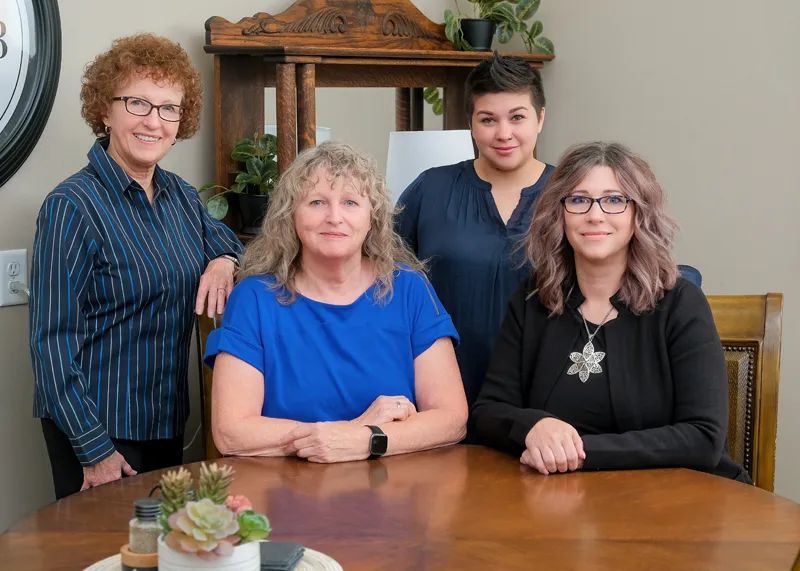
Help & Hope
NAMI Billings lends a hand to those with mental illness
Twenty years ago, when Bobbi French’s son was nearing the end of eighth grade, he came to her and told her he was really depressed. A doctor prescribed anti-depressants for her son, but within three weeks he tried to commit suicide, and he made two more attempts over the summer.
Bobbi says members of her family had previously had juvenile diabetes, a universally recognized disease about which people were sympathetic and understanding. Not so with the diagnosis of bipolar disorder her son received.
There was not only a lack of understanding, Bobbi says, but almost a coldness among friends and extended family. She was often told her son needed to pull himself up by his bootstraps, that she and her son simply had to deal with it and move on.
“It was frightening,” Bobbi says. “I thought, even at home you couldn’t get support.”
And then she heard about NAMI Billings, the local affiliate of the National Alliance on Mental Illness. Bobbi attended a Family Support Group at the NAMI office — which, like all NAMI offerings was free — where she learned that her struggles were far from unique, and that there were things she could do to help her son and to deal with her own problems, which often seemed overwhelming.
“It’s so hard to watch your child be so hurt, and NAMI saved my life—both of us,” she says.
Bobbi hadn’t been using NAMI’s services very long when she was asked by the director of the nonprofit organization to lead eight-week Family-to-Family classes, for families and friends of individuals with mental health conditions. Bobbi went on to teach classes for healthcare workers who provide mental health services, and this summer she was preparing to teach a new class called NAMI Homefront, for family and friends of veterans and current members of the military. (Bobbi’s daughter, a veteran, was also diagnosed with bipolar disorder.)
There is much about Bobbi’s story that is unique, but she also typifies what makes NAMI Billings tick.
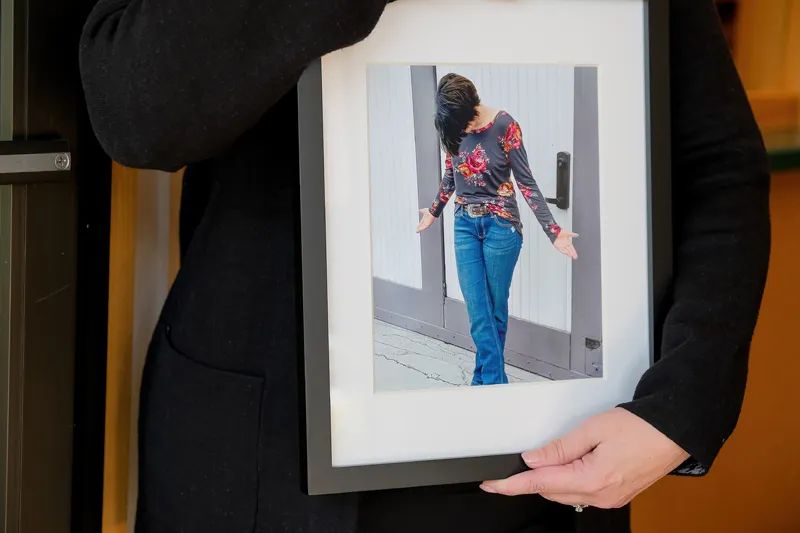
Dee Holley, who helped found NAMI Billings almost 30 years ago and was its volunteer executive director for eight years, says board members, employees, teachers and facilitators, most of them volunteers, almost all have one commonality.
“Our biggest asset has been the people who have experienced the illness and who have loved ones who have experienced it,” Dee says. “Because they get it from the inside, from the heart, and they’ll do whatever they can for very little pay to keep this organization going.”
One of those people is Alicia Willard, the part-time office manager at NAMI Billings, located at 955 Broadwater Square, just across the street from YWCA Billings. Alicia has two adopted daughters. The older one came to her family at age 2, and by 3 she was diagnosed with reactive attachment disorder and several other conditions, all the result of early-childhood trauma.
Children like her daughter don’t know how to accept love, and they create conflict as a way of reinforcing their belief that they are themselves unloved. To make matters worse, Alicia herself had experienced trauma at 18, but didn’t realize she was struggling with post-traumatic stress disorder. The mother-daughter traumas made for constant clashes.
“You put two combustible people together and it was a war zone in our house,” Alicia says.
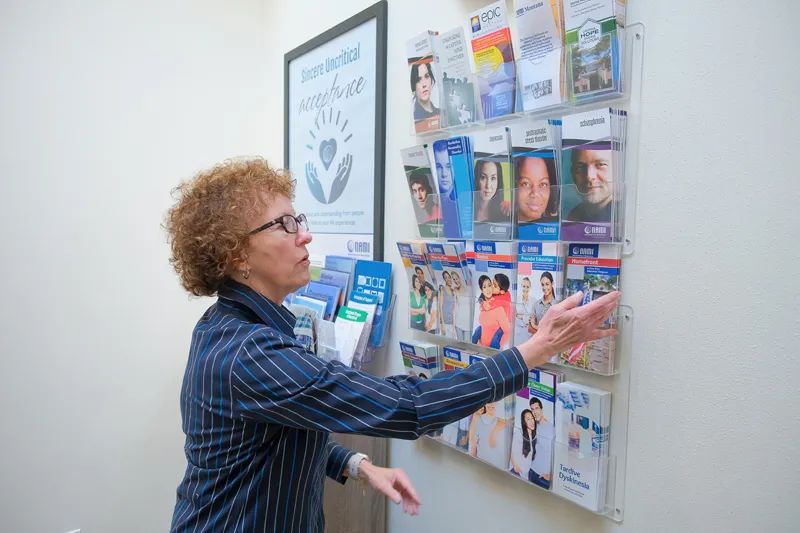
She attended meetings sponsored by Child Bridge Montana, which tries to provide a support system for people with adopted children or kids in foster care, but she found little understanding for people like her and her daughter.
“People run from you when you have a child with these issues,” she says. “They don’t invite you over for dinner. They run from you.”
But another woman at a Child Bridge meeting told Alicia she was a volunteer at NAMI Billings, and she suggested looking into what the organization had to offer. Alicia did an internet search and discovered that NAMI Billings was looking for an administrative assistant. She applied and was hired, and she was soon taking classes through NAMI as well.
In the course of trying to help her daughter, Alicia eventually realized that she suffered from PTSD.
“So I call my daughter the gift that that keeps on giving,” Alicia says. “I used to say that in a negative way because she kept on giving us everything we never wanted, with her behavior. But now I look at this in a really joyful, positive light. Because of her, I got the help I needed. Because of her, our family is more cohesive and better. We’re better able to communicate with one another.”
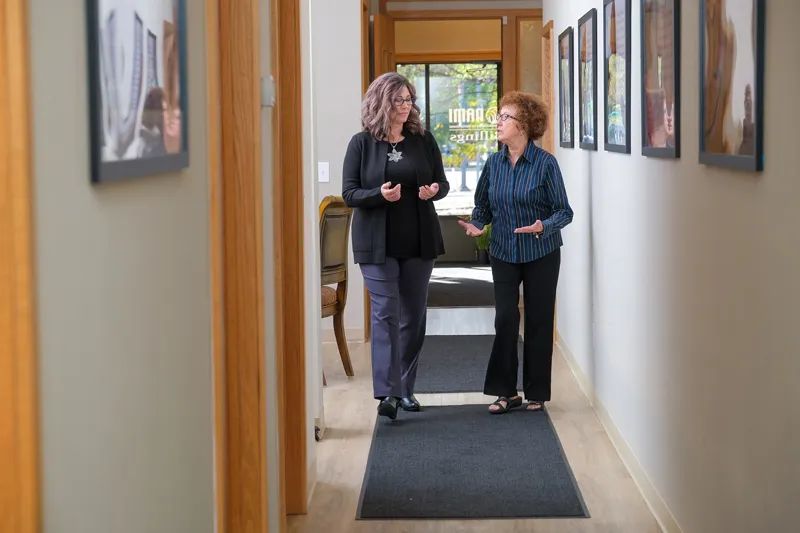
Another employee who also makes use of the organization’s services is Michelle Johansen, NAMI Billings’ program and volunteer coordinator. She had been diagnosed with multiple mental health conditions in her early 20s in California, and she lived in Arizona before moving to Billings in 2017.
Previously, Michelle says, she had had experience with inpatient and outpatient treatment, medication, and therapists. In Billings, she attended a NAMI support group.
“I remember my first support group and the facilitators, and how I was immediately attracted to what we were doing here,” she says. “And I knew that I wanted to be here and that I wanted to be involved.”
After her very first support group meeting, she volunteered. She helped out in various ways for a couple of years before becoming a support group facilitator, and this summer she began working as a part-time employee.
“It was the support groups here that really helped my recovery, my journey, because it was something consistent, something I could depend on,” Michelle says. “It was a judgment-free zone where I was free to speak my mind and look around the room and see a bunch of people nodding their heads in agreement. I knew I was in the right place.”
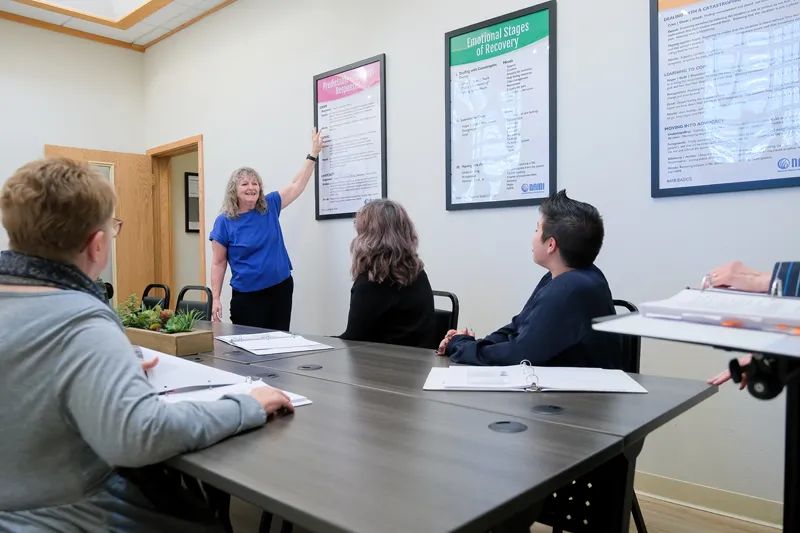
Such testimonials are music to the ears of Dee, who remains active in the organization nearly 30 years after helping found it. Now a retired pharmacist, she and her husband, retired pathologist Dr. Paul Holley, helped start the local affiliate because when their son was diagnosed with bipolar disorder in 1990, there were no support groups, no classes, “no one to talk to.”
Dee and her husband continue to teach the Family-to-Family classes, and she emphasizes that the classes are also for friends, neighbors, loved ones.
“Anyone who’s associated with a person with a serious mental illness and who wants to help them or is involved in their life in some way — they can get a really unbelievable education about those issues,” Dee says.
And yet, despite all the progress, Dee adds, there is still stigma attached to mental illnesses.
People still question the need for medication and therapy, and people are expected, somehow, to live “normal” lives despite debilitating conditions.
“I believe we’ve made progress,” Michelle says, “but it’s step by step.” In her early 20s, she says, she asked a doctor for medication to deal with her anxiety. He told her he hesitated to prescribe a certain drug because it could be sold on the street.
“So right there he labeled me as someone who could potentially be abusing these meds, or selling them,” she says. “It was the most discouraging thing I’d ever experienced from a physician.”
Dee recalled that when her husband had cancer, “the whole community was at our doorstep. Casseroles, flowers, everything you could imagine.” By contrast, when her son was dealing with mental illness, there was almost no support, no understanding.
“It’s a completely different atmosphere for people with a brain illness,” Dee says, “and families are desperately affected by that, in a very negative way. And they lose hope so quickly. That’s one of the things NAMI does: we provide people with hope.”
TO LEARN MORE
The National Alliance on Mental Illness is the biggest grassroots mental health organization in the United States, and all its classes and support groups are free. NAMI volunteers also offer community presentations, and the organization has a lending library. Its offices are located at 955 Broadwater Square, and more information is available at namibillings.org. You can also call NAMI Billings at 406-256-2001.










